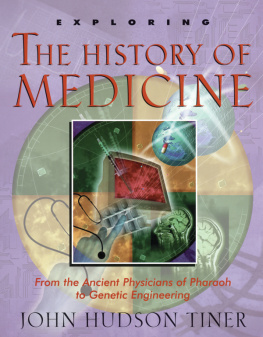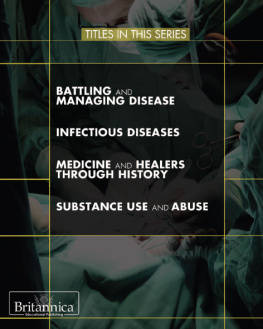First printing: April 1999
Copyright 1999 by Master Books
All rights reserved. No part of this book may be used or reproduced in any manner whatsoever without written permission of the publisher except in the case of brief quotations in articles and reviews.
For information write: Master Books, P.O. Box 726, Green Forest, AR 72638
ISBN-13: 978-0-89051-248-7
Library of Congress: 99-70076
Interior Design by Brent Spurlock
Cover Design by Left Coast Design, Portland, Oregon.
Printed in the United States of America.
For other great titles please visit our web site:
www.masterbooks.net

Dedication
This book is dedicated to Samuel Conner Stephens
Table of Contents
Chapter One
The First Physicians
SYMPTOMS
1. Doctors relied on myths and magical powers.
2. Some doctors were mistreating their patients.
3. Doctors did not understand how the body worked.
Can you Diagnose the Discoveries?
Do you know the name of the most ancient doctor known? The physician Imhotep (pronounced im-HOH-tep) lived 55 centuries ago, in 3500 B.C., in Egypt. He earned fame in many fields as a politician, astronomer, architect, and physician. He designed the first pyramid an elaborate tomb for one of the Egyptian pharaohs.
Ancient Egyptian physicians worked harder at keeping the body free of decay after death than at keeping it free of disease during life. They believed the road to eternal life lay in preserving the body. They developed an effective way to embalm bodies. Some Egyptian mummies are still around today.
In addition to preparing bodies for burial, Imhotep may have performed simple surgical operations. But any break throughs in medicine that he may have made are buried in the mists of time. We know his name and little else.

The first physicians known to western medicine were located in Egypt, Greece, and Rome.
A more famous ancient physician is Hippocrates (pronounced hi-POK-ruhteez). We not only know his name, but also know other facts about his life and his medical discoveries. Plato, one of the best-known Greek philosophers, mentioned Hippocrates by name, as did Aristotle, another Greek scientist. They thought well of him and considered him the greatest doctor of their day.
Hippocrates, a Greek, was born in 460 B.C., almost 2,500 years ago, on the island of Kos. This rocky little island is north of Rhodes off the coast of Asia Minor.
Although he lived so long ago, we do have a good idea of what he looked like. In 1933, workers uncovered on Kos a statue of Hippocrates. The statue shows him as a short man, rather stately in his robe, with a bold, courageous look to his face.
He needed all the boldness he could muster to change how doctors practiced medicine.
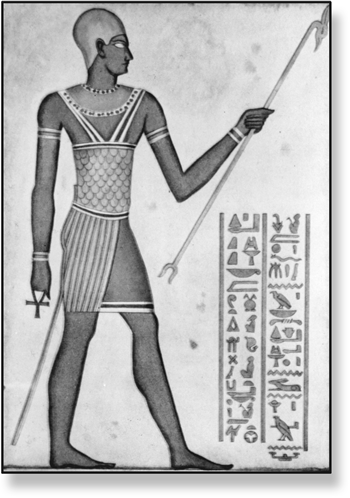
Imhotep is considered the first known physician. He is shown below in a re-creation of an Egyptian wall painting. The primary duty of an Egyptian doctor was to prepare bodies for the afterlife.
Other doctors based their healing art upon the belief that evil spirits, hateful demons, and vengeful gods struck people with diseases. Invisible arrows shot by the Greek god Apollo caused pain. One treatment for disease called for the victim to travel to one of the many pagan temples in Greece. The sick person made a sacrifice and then spent the night in the temple. As he slept, he was supposed to dream away the sickness.
Hippocrates visited Egypt early in life and studied medicine there. He taught at various places, including Athens. Eventually he returned home and began a school of medicine on Kos.
Hippocrates taught methods that must have seemed strange to doctors who expected to treat their patients with chanting and magic potions. Hippocrates changed all of that. He believed every disease had a natural cause. Find the cause, he said, then you can cure the disease.
He perfected what today would be called a good bedside manner. He gained the confidence of patients and put their minds at ease. Hippocrates instructed his students to find out as much as possible about the patient. Ask the patient about the symptoms. How did he feel when the illness began? Question him about what he usually eats and drinks. Did he change his diet?
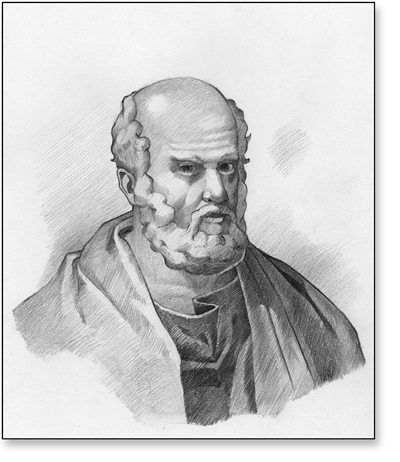
Hippocrates is known as the Father of Medicine. He is considered one of the greatest physicians the world has ever known.
Allow the patient to rest, he advised. See that he is kept clean, has fresh air and simple wholesome food. This was good advice because doctors knew so little about medicine. God has given the body the ability to heal itself if given time to work.
Older doctors couldnt abide by the new ways. They expected patients to make sacrifices to Greek gods and goddesses at the many pagan temples. The gods will be angry, these doctors warned. They will punish doctors and patients who dare to defy them.
We know in detail what Hippocrates taught because his students made careful notes of his lectures. They collected the notes and published books in his name. More than 50 books carrying his name have come down to us.
For instance, Hippocrates said, Desperate diseases require desperate remedies, and, Illness is sometimes stronger when a mind is troubled.
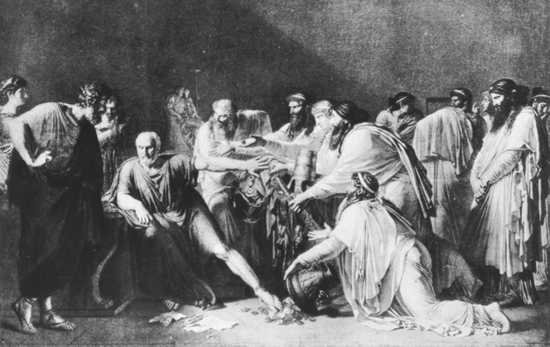
Hippocrates is refusing the bribes of a rich man who wants him to make a person sick on purpose. This is one of the reasons that he developed the Hippocratic Oath. His oath is still taken by doctors today.
His study of diet also convinced him that one mans meat is another mans poison. In other words, the same food can make one person sick but cause no harm to another person.
Hippocrates also made changes in sometimes bribed to see that a patient died, or asked to prepare poison to kill an enemy. Suppose a ruler wanted to rid himself of a rival. He could hire a court physician who would see that the rival became sick and died.

This Scamnum was a medical instrument used by Hippocrates.
Hippocrates taught against such improper conduct. He told his students to treat everyone the same both friends and foes, rich and poor. Sometimes give your services for nothing, he urged his students. For where there is love of man, there is also love of medicine.
He drew up a statement describing proper conduct. The pledge, called the Hippocratic Oath, is a guideline for honorable standards of action. Medical students still take it upon completion of their course of training. The statement says in part, I will use treatment to help the sick according to my ability and judgment, but never with the view to injury and wrong doing... Into whatsoever houses I enter, I will enter to help the sick.

